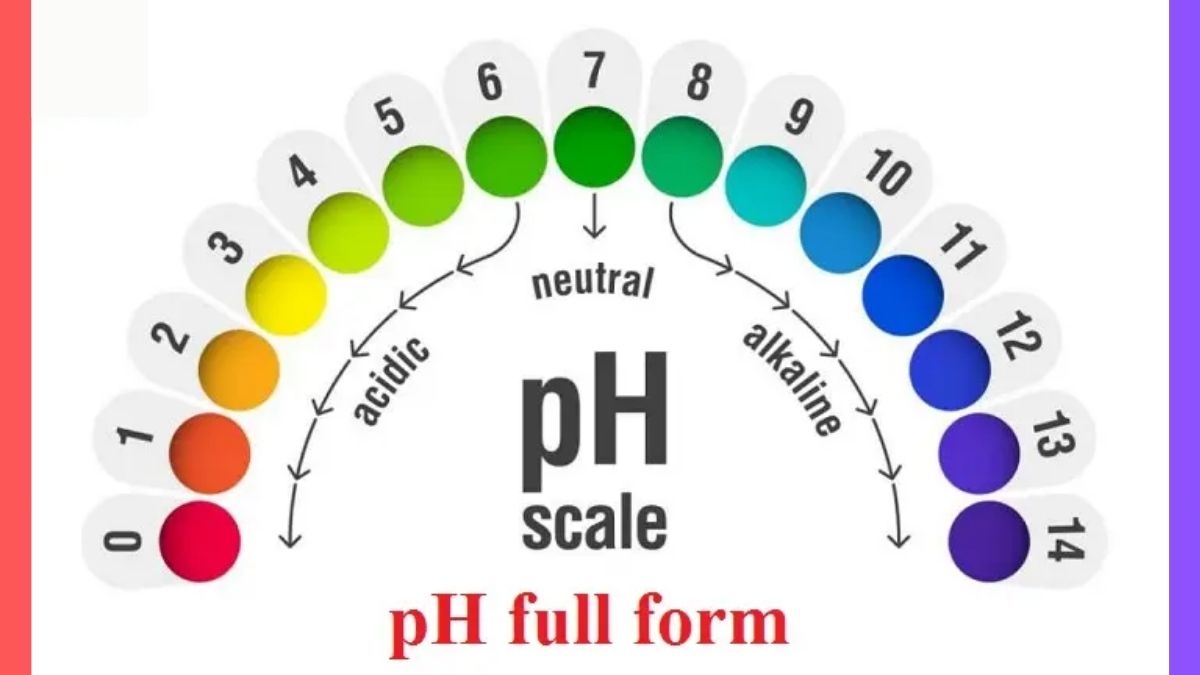You all must have done the experiment of finding the pH of a substance using the litmus paper in your school. You should know that the pH of any substance is used to determine its acidic, basic or neutral nature. Have you ever wondered or asked yourself while doing the pH experiment that what is the pH full form. In this article, we will help you learn about the pH full form along with its several other aspects.
pH Full Form
The pH full form is Potential of Hydrogen. It is the ratio of Hydronium ions to Hydroxide ions. pH is defined as the inverse logarithm of the concentration of H+ ions. Therefore, the term pH is defined as the potency of hydrogen. pH signifies the level of hydrogen ions in a solution, indicating whether it is acidic or basic. The pH scale ranges from 0 to 14 in pH value.
What is the Full Form of pH
As stated earlier, pH stands for Potential of Hydrogen. pH measures the concentration of available hydrogen and hydroxide ions in water. Water with high acidity has an abundance of free hydrogen ions, whereas water without acidity contains a greater concentration of hydroxyl ions. The pH level of water is a notable indicator of its chemical composition alterations due to the presence of chemicals in the water.
pH Full Form: the pH Scale
The range of a pH scale is from 0 to 14. Anything below 7 on the pH scale is acidic. Anything above 7 on the pH scale and below 14 is basic in nature. The value if it is at exact 7, then it is known as neutral. pH means the strength of hydrogen in a solution.
- The solution that has a value below 7 on the pH scale is known as an acidic solution.
- The solution that has a value above 7 on the pH scale is known as a basic solution.
- Solution with an exact value of 7 in the pH scale is known as Neutral (Water is Neutral).
Relation Between pH and Acidic Strength
As you now know the pH full form, you should know about the relationship between pH and the acidic strength. The acid and base intensity depends on the number of H+ and OH– ions produced. Acids furnishing more H+ ions are known to be strong acids, and vice versa.
Solutions that have a value of 0 on the pH scale are known to be extremely acidic. Similarly, solutions that have a value of 14 are known to be alkaline. The H+ and OH- determine the level of acidity and basicity in a solution. As the acidity increases as the pH value decreases and the alkalinity increases as the pH value increase. An example of a neutral solution is water. It has the perfect value of 7 on the pH scale.
pH Full Form- pH Equation
The pH is the logarithm of the hydrogen ion concentration in a water-based solution.
pH = -log[H+]
The log serves as the foundation. [H+] is the concentration of hydrogen ions measured in moles per liter, and logarithm base ten. Remember, a solution must be in aqueous form in order to have a pH value. It is not possible to determine the pH of vegetable oil and pure ethanol.
pH is based on a method of measurement. The National Institute of Standard Technology has defined pH values as electromotive forces. According to them, these forces exist between electrodes that are present in a solution.
pH Full form in Chemistry, Biology, Physics
A pH meter consists of a voltmeter each attached to one electrode that is present in the solution. Silver chloride electrode is mostly used in the solutions. These electrodes act as batteries when they are immersed in the solution. Battery-powered pH scales can be carried into fields for checking soil quality. You can also conduct a test with other options like litmus paper.
The results won’t be accurate and will have diversions. It is better to test with a pH scale if it is available. Soil is tested in agriculture to know which type of crops can be grown there. If the soil is acidic, then only selected types of vegetables can be sown. Acidic soil is infertile and so it is either sweetened or neutralized with lime to grow crops.
Use of pH in Canning of Foods
Foods are classified as either “acid foods” (pH below 4.6) or “low-acid foods” (pH 4.6 or above). The safe canning method is determined by the pH of the foods. Acidic fruits and pickles can be effectively stored in a plastic bucket using a boiling water bath method; the combination of acidity and 212°F boiling water can eliminate spoilage organisms such as molds and yeast.
Using a proper boiling water canning method is essential in order to prevent the growth of acid-resistant molds and yeasts, which can result in an increase in pH. Adding citric acid or lemon juice while canning in a boiling water bath canner is necessary as certain foods such as figs and tomatoes may have pH levels slightly higher than 4.6. To ensure safety, green leafy vegetables should be cooked in a pressure canner due to their low acidity.
Importance of pH
After knowing the pH full form, you should now learn the importance of pH. Some of the importance of pH are given below.
- An organism can only tolerate a certain amount of pH shifts, beyond which survival becomes challenging. In instances of acid rain, the water has a pH level below 7. As river water flows into a river, it lowers the pH level, making it difficult for marine life to survive.
- The stomach lining of humans produces hydrochloric acid to aid in food digestion by activating specific enzymes. Antacids are utilized to counteract the stomach acid generated during acid reflux.
- Frequently, the bacteria in our mouth reduce the pH levels by producing acids when breaking down food particles. This leads to the mineral loss of teeth and the development of tooth decay. Hence, it is advised that we should brush our teeth and rinse our mouths regularly as mouthwash can neutralize acid and aid in remineralization. Fluoride toothpaste helps with remineralization and stops decay from occurring.
- When a bee stings us, the injection of formic acid (methanoic acid) causes significant pain. Hence, it is typically suggested to use baking soda or other gentle bases on the surface to neutralize the acid and keep the pH balanced.
| Related Articles | |
| Nitrogen Dioxide | Atomic Numbers and Atomic Mass |
| Endothermic Reaction | Aufbau Principle |











 Chemistry Investigatory Project Class 12...
Chemistry Investigatory Project Class 12...
 CBSE Class 12 Chemistry Viva Questions w...
CBSE Class 12 Chemistry Viva Questions w...
 CUET Chemistry Syllabus 2026, Download O...
CUET Chemistry Syllabus 2026, Download O...














